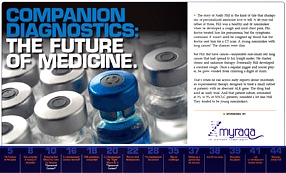 About two weeks ago, the biggest-selling drug of all time fell off patent. The flurry of news coverage wasn't just about Lipitor and Pfizer's future without that $10 billion-plus in annual sales. It was the symbolic end of an era, a sort of mourning-the-passing of a time when Big Pharma stocks flew high and companies were hiring by the hundreds in the U.S. and Europe rather than China.
About two weeks ago, the biggest-selling drug of all time fell off patent. The flurry of news coverage wasn't just about Lipitor and Pfizer's future without that $10 billion-plus in annual sales. It was the symbolic end of an era, a sort of mourning-the-passing of a time when Big Pharma stocks flew high and companies were hiring by the hundreds in the U.S. and Europe rather than China.
Of course, some pundits pointed out that mass-market blockbusters aren't completely passé. But much of the talk focused on another approach to the drug business: treatments for small populations. In some cases, those patients are easy to spot; they're the ones with rare, debilitating diseases, and payers are willing to spend tens of thousands--even hundreds of thousands--on their treatment.
Others aren't so obvious. They can't be picked out of a lineup without a diagnostic test. Many can't even be identified that way yet, because the biomarkers that distinguish their disease haven't been found. But these patients promise a way forward for drugmakers that can find those markers and treat the patients who have them--and the diagnostics companies that can develop tests to identify those patients.
Consider this: Just as Pfizer was preparing to turn the page on Lipitor, it won approval for a lung cancer drug that works in less than 5% of patients. Xalkori fights the disease in patients with a variant of the ALK gene. It's priced at $9,600 per month, or $115,200 per year of treatment. Analysts expect it to peak at an enviable $2.5 billion in annual sales.
On the same day that Pfizer won the FDA's approval for Xalkori, Abbott Laboratories got the OK for a diagnostic test that identifies appropriate patients. The diagnostic-and-drug team, and its tandem approval, are just the sort of developments the FDA says it wants to encourage. But for a variety of reasons--from regulatory snarls to cultural stumbling blocks--the Xalkori success is more of an exception than a rule. That's changing, thanks to some forward-thinking companies, advocacy groups, payers, investors, and, yes, even regulators.
In a new ebook, we've taken a look at the development of targeted drugs and companion diagnostics, from the successful projects to the not-so-successful, and at the obstacles that remain. What's being done to overcome them? What can companies themselves do? And what's the potential payoff of all that work? We invite you all to check it out.
Click here to download the free ebook on companion diagnostics. - Tracy Staton (twitter | email)
Publishers Note: This complimentary e-book PDF download made possible by our sponsor Myraqa. And watch this space on Wednesday for Kindle, Nook, and iBooks optimized versions. - Arsalan Arif, Publisher (twitter | email)